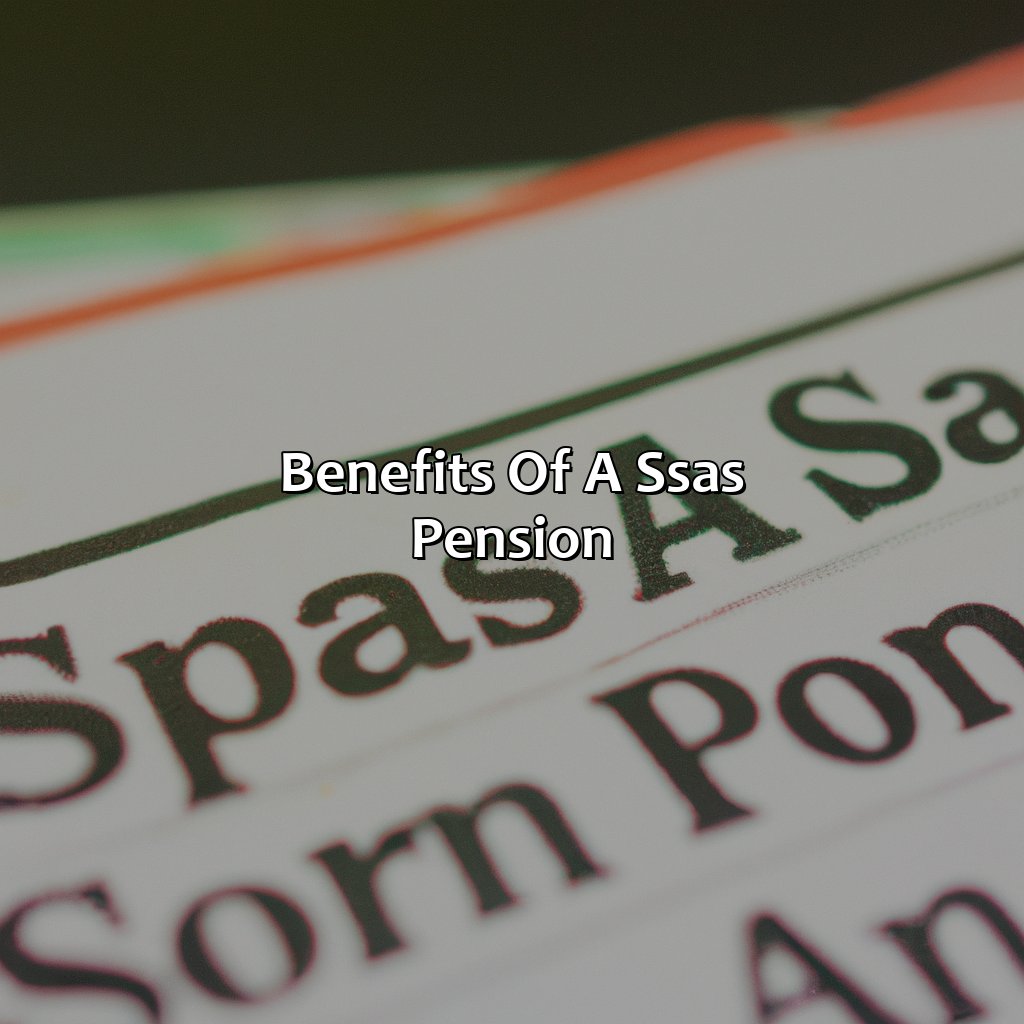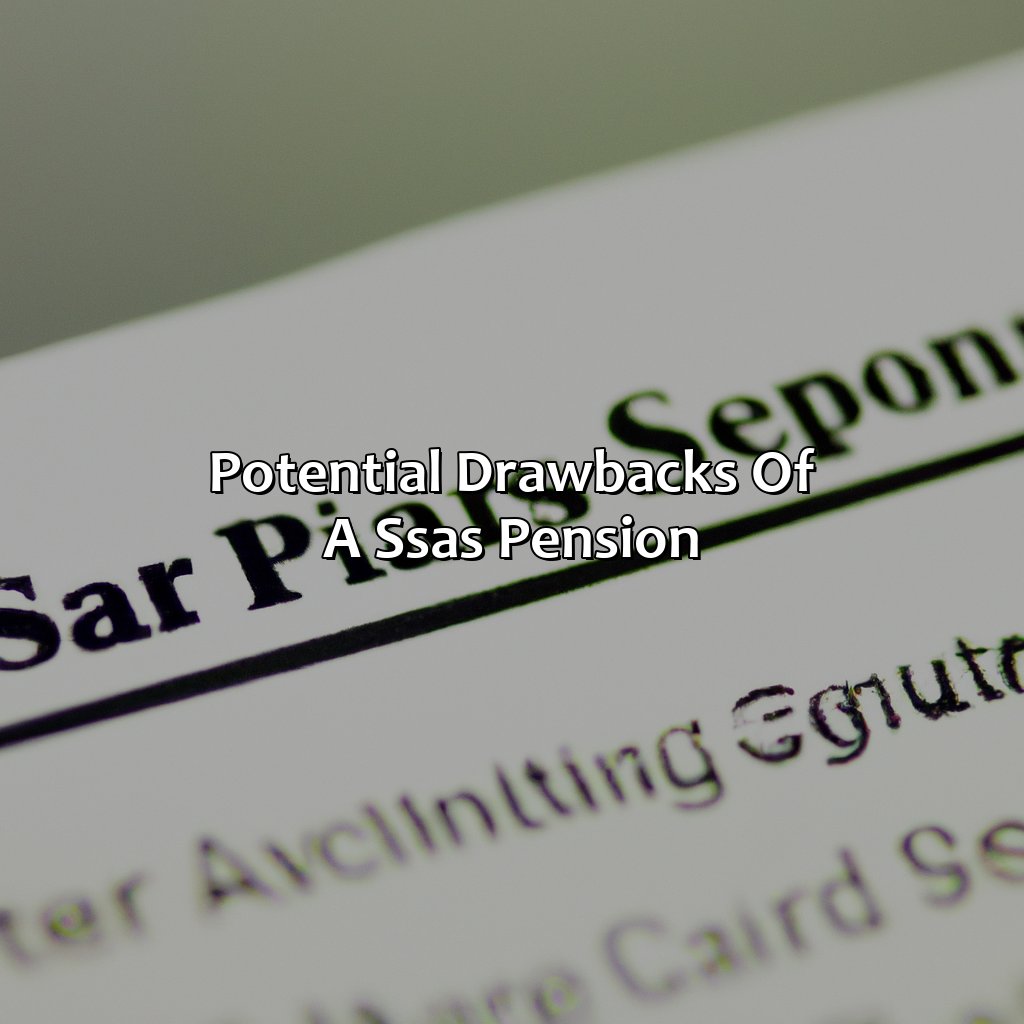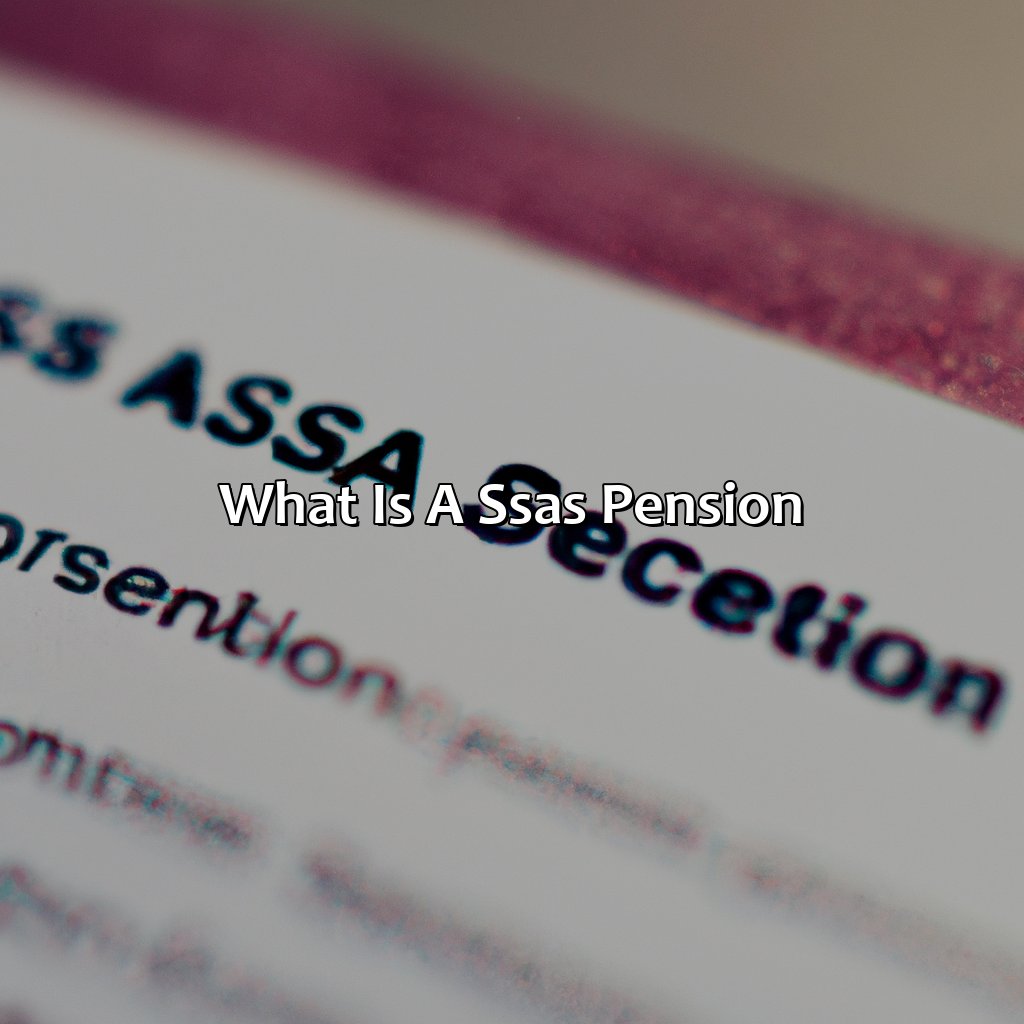What Is A Ssas Pension?
Key Takeaway:
- A SSAS pension is a type of pension scheme that stands for Small Self-Administered Scheme.
- A SSAS pension provides features such as flexibility, investment control, and tax advantages that differ from other pension schemes, such as personal or workplace pensions.
- To set up a SSAS pension, individuals must establish a legal trust, appoint trustees, and register the scheme with HM Revenue & Customs. Funding can come from employer contributions, member contributions, or transfers from other pension schemes.
- The benefits of a SSAS pension include the ability to invest in a broad range of assets, including property, and the ability to borrow money from the scheme. Tax advantages include the ability to make contributions up to certain limits and receive tax relief.
- Potential drawbacks of a SSAS pension include high costs associated with administration and investment management, as well as complex regulatory requirements.
Are you considering a SSAS pension, but don t know where to start? You ve come to the right place. This article will help you gain an understanding of what a SSAS pension is and the benefits it offers. Learn the basics now and make the best decision for your retirement.
What is a SSAS pension?
A SSAS pension is a type of UK pension scheme for small businesses. It is a self-invested personal pension that allows members to invest in a range of assets, including commercial property. Unlike other pension schemes, SSAS pensions can be set up and run by the members themselves. They offer greater flexibility in investment decisions and can result in tax benefits for the members. In addition, SSAS pensions can be used to borrow money for investment purposes, but this carries risk and should be carefully considered.
A key benefit of SSAS pensions is their greater control and flexibility for members in directing investments. However, members must ensure that investments are made with the primary objective of providing retirement benefits for the scheme members. Setting up a SSAS pension may seem complicated, but with the right guidance and understanding of your options, it can be a valuable addition to your retirement plan. SSAS pensions are also subject to regulation by The Pensions Regulator, and members must comply with legal responsibilities in running the scheme.
It is important to note that pension funds may not be suitable for everyone, and advice from financial professionals should be sought before making any investment decisions.
Pro Tip: Members should regularly review their SSAS pension investments and ensure they are in line with their retirement goals and objectives.

Image credits: retiregenz.com by Harry Washington
How does a SSAS pension work?
A SSAS pension is a type of pension scheme where company directors and senior members of staff have control over investment decisions. The SSAS is set up as a trust, giving the members a legal ownership of the assets. This means that the trustees can make investment decisions for their pension scheme, which can include investing in commercial property, stocks and shares, and other assets.
It offers greater flexibility than other pension schemes because it allows investors to decide where their money is invested. SSAS pensions also allow for loans to be taken against the pension fund, which can be useful in certain circumstances such as buying commercial property for business use. Learn more about EE pensions and how they compare to SSAS pensions.
It is important to note that managing a SSAS pension can be complex and requires a lot of knowledge and expertise. Hiring a professional trustee or pension administrator can help ensure that the scheme remains legally and financially compliant. To learn more about the different types of pensions, including the Category A State Retirement Pension, you can check out our website.
To ensure a successful SSAS pension scheme, it is important to have regular reviews and to keep up to date with changes in legislation. Diversifying the investments can also minimize risk and maximize returns. Using a mixture of assets that have different risk profiles can help achieve this.

Image credits: retiregenz.com by James Jones
Benefits of a SSAS pension
When it comes to retirement planning, a SSAS pension offers significant benefits for company directors and business owners.
These benefits include:
- Greater control over investment decisions than other pension schemes.
- Flexibility in making contributions and taking benefits.
- Potential tax benefits for employees and the company.
- The ability to loan funds to the sponsoring company.
In addition, TPS pensions allow for the pooling of funds and the ability to invest in a wider range of assets. This provides the opportunity for potentially higher returns than other pension schemes. To know more about what is a TPS pension, click here.
Pro Tip: It’s important to work with a professional advisor to ensure that a SSAS pension is the right choice for your individual circumstances and to maximize the benefits it can offer.

Image credits: retiregenz.com by Yuval Arnold
Potential drawbacks of a SSAS pension
While SSAS pensions can offer many benefits, there are certain factors one must consider before investing.
The following are some factors to consider before investing in a pension scheme:
- Limited investment options: Pension schemes limit the investment options available to investors, which may prove to be restrictive for some.
- Complexity: Due to their complexity, pension schemes require specialized knowledge and meticulous management, which can be time-consuming and costly.
- High initial costs: Pension schemes require substantial start-up costs, which can make it an unfeasible option for individuals with small investments.
- Limited portability: Once invested, pension fund are not easily transferable, which can pose a challenge to investors seeking greater liquidity.
- Regulation: Pension schemes are strictly regulated, which can be both a benefit and a drawback. While these regulations ensure investor protection, they can also limit flexibility in investment decisions.
Be mindful that some pension schemes allow for loans to participating companies and members, which can prove beneficial in some situations. However, such loans require careful management to avoid incurring high tax penalties.
It is recommended that investors seek professional advice before investing in an SSAS pension. Additionally, regular review and analysis are essential to ensure the scheme remains profitable and suitable for the investor’s needs. Diversification of investments and cost-efficient management can also help maximize the benefits of an SSAS pension scheme.

Image credits: retiregenz.com by Joel Woodhock
Five Facts About SSAS Pension:
A SSAS pension is a type of occupational pension scheme. (Source: Pensions Advisory Service)
SSAS pensions are set up by companies to provide retirement benefits to their employees. (Source: PensionBee)
SSAS pensions are regulated by the UK government. (Source: GOV.UK)
A SSAS pension allows individuals to have greater control over their retirement savings and investment options. (Source: Hargreaves Lansdown)
SSAS pensions offer tax benefits and can be used for estate planning and passing on wealth to future generations. (Source: Self-Invested)
FAQs about What Is A Ssas Pension?
What is a SSAS pension?
A SSAS pension (Small Self-Administered Scheme) is a type of UK workplace pension designed for small businesses and company directors. It allows individuals to take greater control of their pension savings by allowing them to pick and choose investments and manage the scheme themselves.
Who can set up a SSAS pension?
A SSAS pension can be set up by small business owners, company directors and executives. It requires a minimum of two members, both of whom must be trustees, and can have up to 11 members.
What are the benefits of a SSAS pension?
One of the main benefits of a SSAS pension is the flexibility and control it provides. It allows individuals to invest in a wider range of assets, including commercial property and unlisted shares. It also allows members to make loans, which can be a useful source of funding for small businesses.
What are the risks associated with a SSAS pension?
One of the main risks of a SSAS pension is the level of responsibility and knowledge required to manage it effectively. Trustees are legally responsible for the management and administration of the scheme, which can be challenging and time-consuming. There is also the risk of investments falling in value, which could impact the overall value of the scheme.
How is a SSAS pension taxed?
As with all pensions, contributions to a SSAS pension are tax-free up to certain limits. The income and gains generated within the scheme are also tax-free. When benefits are taken, the tax treatment will depend on the type of benefit and individual circumstances.
Can a SSAS pension be transferred?
Yes, a SSAS pension can be transferred to another scheme, subject to certain rules and conditions. It is important to seek professional advice before making any transfers, as there may be charges and tax implications to consider.
 Checkout this IRS Loophole
Checkout this IRS Loophole 
